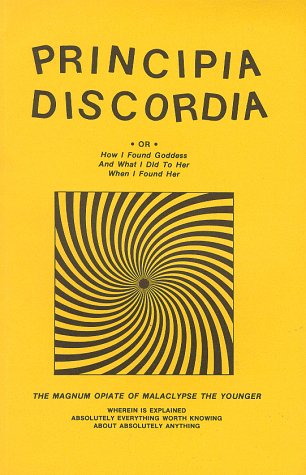
|
There is a point in Principa Discordia, where one of the many scribbles and stamps found in its margins reads, “If you think this book is just a Ha-Ha, then go back and read it again.” The older I get, the more truth I find in this statement. Discordia is a very free and liberating religion, cleverly disguised in collage of jokes and nonsense, easily dismissed by the greyfaces.
Where did this book come from? Not much is known about that. Its earliest known appearance was in 1968, during a short-run publication. Years later a funny thing happened, copies began to appear all over the world. The book was not in print, but that was not keeping people from reproducing and distributing it freely. After all, there are no copyrights for this work. In fact, you can read the full text online here
Who can claim authorship of this text? Rumors abound. Some say it was written by Timothy Leary during one of his extensive LSD trips. Others speculate Richard Nixon scribed it in one of his more lucid moments. Equally possible is that it was transmitted by aliens from the dogstar Sirius. Whoever Malaclypse the Younger is, we may never know, but their work has survived decades and inspired the countless conspiracy theories involving the Illumnatus.
Malacylpse’s anonymity can be taken as a sign of the authors devotion to their ideas. Another evidence of this is the fact that the book is not copyrighted. Anyone can reproduce it or add to it. That’s how it became popular in the first place, not through sales but through underground production.
So what is Discordianism? My freshman year of college, I attended a club bazaar. There was chess, debate, astronomy, yadda yadda… then there was the Blacksburg Discordian Society. It was the only club I signed up for. A month later, I remembered signing up for the society, and was wondering why I hadn’t heard from them. So I gave the local POEE leader a call and asked when we were going to have a meeting.
“You blasphemer,” he laughed, “Meetings are anti-discordia!”
At the heart of Discordia is the Greek Goddess of Chaos, Eris. Little is known about the legends surrounding her, but she assures her followers that the Greeks exaggerated her bad aspects due to “indigestion.” So throw out what you learned about her from watching the animated film “Hercules” or the ghastly statue of the Goddess. The Erisian perspective on their goddess is one of neutrality, matching our modern understanding of chaos.
The book is filled with paradox, contradictions that include, but also go way beyond the “This statement is false” classic. In fact the Erisian commandments themselves are paradoxical. As they command Discordians to “partake of a hotdog on Friday” as an act of rebellion against the religions such as Catholicism (No meat on Friday), Judaism (No Pork), Hinduism/Buddhism (No Meat), and Discordia (No HotDog Buns). The fifth and final commandment prohibits all Discordians from “believing anything they read.”
Principa Discordia also plays on perception. There are many possible interpretations of Erisian symbols, and they are all valid. Erisians love the number five, which everything is related to, whether through being related to it or not being related to it. As Omar said to Mal-2, “I find the law of fives more prevalent the harder I look.”
Don’t let the absurdity fool you, it is wrong to dismiss the book as merely drug-induced rantings. Doing so misses the book’s many profound points. Consider the following observation on Entropy:
[Entropy] applies however, to a closed system, to something that is an isolated whole, not just a part. Within such systems there may be parts, which draw their energy from teh whole, that are moving at least temporarily, in the opposite direction; in them order is increasing and chaos is diminishing.
The whirlpools that swirl in a direction opposed to the main current are called “enclaves”. And one of them is life, especially human life, which in a universe moving inexorably towards chaos moves toward increased order.
Like so much in Principa Discordia, I did not recognize the brilliance of this passage until much later in life. What a beautiful expression of living, distinguishing us from the rest of the universe. Life, the exception to the rule. Like all great texts, our understanding of it changes as we change.
“Perception is an art, and you are the artist.”